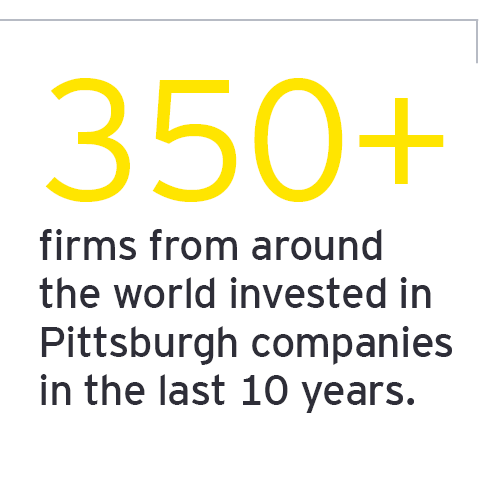Ernst & Young LLP (EY US) and Innovation Works, Inc. are proud to present our 12th annual review of Pittsburgh’s technology investment landscape. This report provides a comprehensive review of investment and exit activity in the Pittsburgh region for 2023 and highlights key trends for 2014–2023.
2023 was the second-highest year on record for dollars invested in Pittsburgh’s tech economy. Across several venture capital investments, large corporate deals, and a number of seed and accelerator investments, the region raked in approximately $3.12b in funding. That amount is second only to the $3.59b raised in 2021, which was a record-breaking year for funding across the globe, driven by an unprecedented volume of public offerings during the post-pandemic economic rebound. Additionally, in a year when artificial intelligence (AI) was a trendy topic, Pittsburgh landed among the top 10 metro areas in terms of number of deals generated in that industry per capita.
National fundraising volume had a year-over-year (YOY) decline from 2022 volume, which was already a significant reduction from the peak deal flow of 2021. Total deal value for 2023 came in at $170.6b, which was a 29.6% decrease from 2022’s value and a 50.9% decrease from 2021’s record-breaking value.1
But in Pittsburgh, almost every indicator related to the local fundraising environment saw an increase. In 2023, the total deal value was $3.12b, which was a 203% increase from 2022’s value, and only a 13.1% decrease from 2021’s value.
Average disclosed deal size in Pittsburgh came in at $27.1m for 2023, a 300%+ YOY increase driven by fundraising in the robotics and autonomous vehicle space. Even when those larger deals are excluded, Pittsburgh’s tech economy had a robust performance last year, with the average deal size across venture capital, angel, seed and accelerator investments increasing by 50%, from $4.6m in 2022 to $6.9m in 2023. Further, while data regarding dollars invested in Pittsburgh last year is somewhat skewed toward hardware and robotics, a look at the deal count data shows that companies across all industries are evenly attracting the attention of investors.
The Pittsburgh region saw approximately $621.5m invested by institutional investors, $2.2b invested by corporates and $89.0m in angel, pre-seed or seed funding. Some of the top early stage deals last year — including Series A fundraising — were Optimus Technologies, LyGenesis, Agile Space Industries, Formlogic and BlastPoint. Drawing in the highest volume of investment to the region was the autonomous vehicle industry, with Stack AV’s billion-dollar funding from SoftBank and Aurora’s combined private placement and second public offering. Though industry experts continue to point out the long road to commercial viability for autonomous vehicles, Stack AV’s and Aurora’s successes are still encouraging to the local AI and robotics community.
Technology hubs attract world-class investors. Pittsburgh companies have drawn the attention of leading venture capital firms, including SoftBank, New Enterprise Associates, Sequoia, Tiger Global, Kleiner Perkins and Index Ventures. Additionally, the corporate venture arms of Toyota, Ford, BMW and Samsung have all invested here. In aggregate, over 350+ venture capital firms from around the world have invested in Pittsburgh companies in the last 10 years, including 57 making their first investment in our region in 2023.



The drivers of this growth are Pittsburgh’s world-class technical capabilities and talent, and $12b invested in university research over the past decade. Further, the ecosystem has attracted satellite offices of global companies. Collectively, this has created over $23b of exit proceeds over the past decade and makes Pittsburgh an attractive destination for global investors, talent and companies alike.
Both EY US and Innovation Works are committed to supporting entrepreneurial growth in the region. Tracking investment activity helps us begin conversations with new investors interested in regional deals, informs local investors about our strengths compared with other communities, chronicles what’s working and points to where we need to focus our efforts. We hope this report provides you with useful insights into the state of the local technology community and venture capital ecosystem and inspires new ways to move it forward.
1PitchBook-NVCA 2024 Venture Monitor
Those numbers are up from last year’s deal flow, with corporate investments increasing by nearly 800% from nearly $250m in 2022 to $2.19b in 2023. Despite small YOY decreases in venture capital and angel funding, Pittsburgh’s tech and innovation economy saw a number of early stage deals across hardware, life sciences and software, with a focus on AI. Leading deals overall include capital raised by Stack AV, Carmell Therapeutics, Aurora, Gecko Robotics, Krystal Biotech, Imagine Pharma, Seegrid and Abridge.
Nationally, the number of fundraising deals in 2023 faltered, with the deal count falling by 22.6% from 17,592 in 2022 to 13,608 in 2023. There was an even larger percentage decrease across two years, with deal count falling by 28.5% from 2021 to 2023. While Pittsburgh’s tech economy wasn’t immune to those trends, the region maintained a healthy level of deal flow, as well as a net increase in unique companies funded over the past decade. The YOY rate of decrease in total deal count from 2022 to 2023 was only 5.7%, and for 2021 to 2023 it was only 8.8%, both significantly lower than the national rates of decrease over the same time periods.
The money invested in Pittsburgh’s tech economy in 2023 skewed heavily toward hardware and robotics, due to large private investments in Stack AV and Aurora. But a look at the number of unique companies funded across the main industries showed that Pittsburgh has maintained a relatively even split across deals in software, hardware and life sciences, a promising sign that the region maintains diverse options for investors.
The chart below estimates the annual supply of uncommitted funds at venture capital (VC) firms in the Pittsburgh region. This analysis considers the timing of new fund closings and assumes that a firm will commit 25% of a new fund’s capital during each of the first four years post-closing. If a fund is managed by partners located outside the Pittsburgh region, the amount of the fund’s capital that is “located” in Pittsburgh is determined by multiplying by the percentage of the fund’s partners who are located in the region.
More local investors are needed to support Pittsburgh’s growing companies: Blue Tree Capital Group, Black Tech Nation Ventures, Magarac Venture Partners, Reinforced Ventures and Riverfront Ventures.
Despite this activity, the estimated supply of local VC funding remains very low. A healthy local funding ecosystem streamlines the fundraising process for local startups and helps retain more of the financial rewards of successful exits in the Pittsburgh region.
Last year featured 12 exits with disclosed value of over $1.57b. All of those deals were some form of acquisition, apart from Aurora2 and Coeptis Therapeutics3, which each had deals that included both a private placement of capital and a secondary public offering.
Each successful exit strengthens the regional tech ecosystem. The investors realize a positive return and are more likely to invest in the region again. Other investors learn of these successes and come to consider Pittsburgh a more attractive investment destination. The founders and employees receive windfall gains and may become angel investors or mentors and be financially well positioned to pursue new ventures.
As global firms acquire local startups, it’s often the catalyst for larger firms to establish permanent offices in Pittsburgh.
2
https://ir.aurora.tech/news-events/press-releases/detail/79/aurora-announces-closing-of-820-million-upsized-public
3
https://www.prnewswire.com/news-releases/coeptis-therapeutics-holdings-inc-announces-closing-of-3-5-million-underwritten-offering-301853423.html
Over 300 unique venture capital firms, angel groups and strategic investors have made investments in Pittsburgh companies in the past five years. The chart below contains a sampling of the organizations (listed in bold) that made their first investments in the region in 2023.
Pittsburgh ranks 24th in population but ranked 15th in funding and 21st in total number of deals per million residents in 2023.
Focusing on the AI and autonomous vehicles industries, the charts below show that Pittsburgh punches significantly above its weight, ranking 10th in the number of deals in those industries and 16th in funding per million residents for 2023. Over the past decade, without accounting for population changes, Pittsburgh’s AI and autonomous vehicle economy ranks 13th in the number of deals and 10th in total funding across the country. An in-depth analysis accounting for 10-year population changes would likely push those rankings even higher.
The University of Pittsburgh consistently ranks among the top recipients of National Institutes of Health funding, and the school’s total research budget surpassed $1b for the second time in 2023. Carnegie Mellon University’s research budget across the Software Engineering Institute, Advanced Robotics for Manufacturing Institute and other grants totaled $494m in 2023. Throughout several economic cycles and fluctuations, Pittsburgh’s non-dilutive research budgets have progressively grown, increasing by 71% over the past decade. These grants fund innovation without diluting founders or investors.
Above are the top 15 fundraises by dollar amount for 2023.
The data in this report comes from a combination of the Pitchbook and private company data collected by Innovation Works, Inc. and information reported by Carnegie Mellon University, Duquesne University and the University of Pittsburgh. The investment rounds tracked in these data sets were completed by companies in the Pittsburgh region from January 1, 2010 to December 31, 2023. Note that changes may occur in this report from year to year due to updates in third-party databases and adjustments made to best reflect the timing of investment for rounds that have “rolling closes.” For the purpose of this report, both equity investments and convertible note investments were counted as “venture” investment. The geographic boundary of the Pittsburgh region used in this report corresponds to the Pittsburgh Metropolitan Statistical area, as utilized by the U.S. Census Bureau. Throughout this report, the terms “deal” and “round” are used interchangeably, and refer to a single reported round of funding. Companies may complete more than one fundraising round in a single year, in which case each round is counted as a separate “deal.”
EY | Building a better working world
EY exists to build a better working world, helping to create long-term value for clients, people and society and build trust in the capital markets.
Enabled by data and technology, diverse EY teams in over 150 countries provide trust through assurance and help clients grow, transform and operate.
Working across assurance, consulting, law, strategy, tax and transactions, EY teams ask better questions to find new answers for the complex issues facing our world today.
For more information, please visit ey.com
Innovation Works, Inc. (IW) invests capital, business expertise and other resources into high-potential companies with the greatest likelihood for economic impact in the Pittsburgh region. IW is the single largest investor in seed-stage companies in this region and is one of the most active seed-stage investors in the United States. In addition to the seed fund, Innovation Works, Inc. has three nationally ranked accelerators: AlphaLab, AlphaLab Gear and AlphaLab Health. IW also manages Riverfront Ventures, LLC, an early-stage venture capital fund. Innovation Works, Inc. is an initiative of the PA Department of Community and Economic Development and is partially funded by the Ben Franklin Technology Development Authority.
For more information, please visit www.innovationworks.org